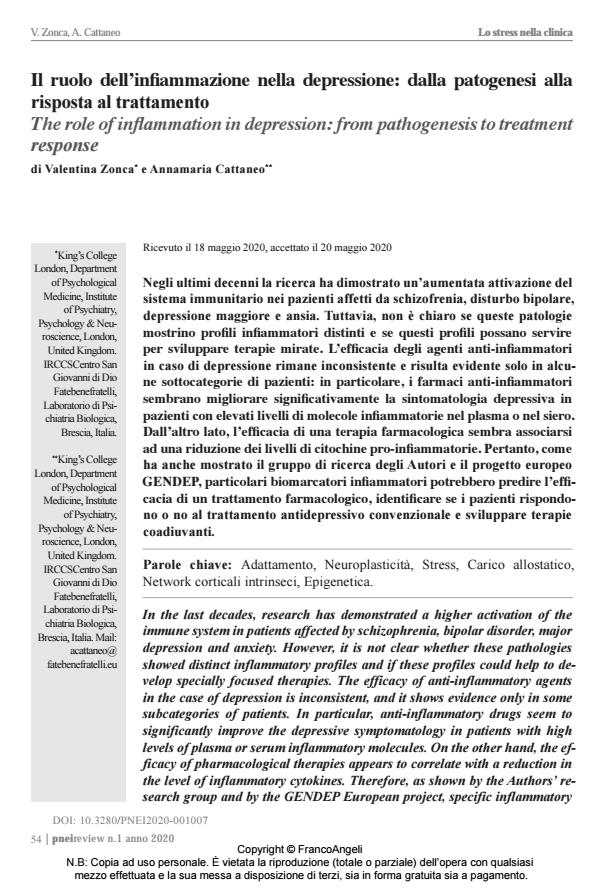Il ruolo dell’infiammazione nella depressione: dalla patogenesi alla risposta al trattamento
Titolo Rivista PNEI REVIEW
Autori/Curatori Valentina Zonca, Annamaria Cattaneo
Anno di pubblicazione 2020 Fascicolo 2020/1 Lingua Italiano
Numero pagine 7 P. 54-60 Dimensione file 132 KB
DOI 10.3280/PNEI2020-001007
Il DOI è il codice a barre della proprietà intellettuale: per saperne di più
clicca qui
Qui sotto puoi vedere in anteprima la prima pagina di questo articolo.
Se questo articolo ti interessa, lo puoi acquistare (e scaricare in formato pdf) seguendo le facili indicazioni per acquistare il download credit. Acquista Download Credits per scaricare questo Articolo in formato PDF

FrancoAngeli è membro della Publishers International Linking Association, Inc (PILA)associazione indipendente e non profit per facilitare (attraverso i servizi tecnologici implementati da CrossRef.org) l’accesso degli studiosi ai contenuti digitali nelle pubblicazioni professionali e scientifiche
Negli ultimi decenni la ricerca ha dimostrato un’aumentata attivazione del sistema immunitario nei pazienti affetti da schizofrenia, disturbo bipolare, depressione maggiore e ansia. Tuttavia, non è chiaro se queste patologie mostrino profili infiammatori distinti e se questi profili possano servire per sviluppare terapie mirate. L’efficacia degli agenti anti-infiammatori in caso di depressione rimane inconsistente e risulta evidente solo in alcune sottocategorie di pazienti: in particolare, i farmaci anti-infiammatori sembrano migliorare significativamente la sintomatologia depressiva in pazienti con elevati livelli di molecole infiammatorie nel plasma o nel siero. Dall’altro lato, l’efficacia di una terapia farmacologica sembra associarsi ad una riduzione dei livelli di citochine pro-infiammatorie. Pertanto, come ha anche mostrato il gruppo di ricerca degli Autori e il progetto europeo GENDEP, particolari biomarcatori infiammatori potrebbero predire l’efficacia di un trattamento farmacologico, identificare se i pazienti rispondono o no al trattamento antidepressivo convenzionale e sviluppare terapie coadiuvanti.;
Keywords:Adattamento, Neuroplasticità, Stress, Carico allostatico, Network corticali intrinseci, Epigenetica.
- Capuron L. and Miller A.H. (2004). Cytokines and psychopathology: lessons from interferon-alpha. Biol. Psychiatry, 56(11): 819-824.
- Fujigaki H., Saito K., Fujigaki S., Takemura M., Sudo K., Ishiguro H. and Seishima M. (2006). The signal transducer and activator of transcription 1alpha and interferon regulatory factor 1 are not essential for the induction of indoleamine 2,3-dioxygenase by lipopolysaccharide: involvement of p38 mitogen-activated protein kinase and nuclear factor-kappaB pathways, and synergistic effect of several proinflammatory cytokines. J. Biochem., 139(4): 655-662.
- Gadad B.S., Jha M.K., Czysz A., Furman J.L., Mayes T.L., Emslie M.P. and Trivedi M.H. (2018). Peripheral biomarkers of major depression and antidepressant treatment response: Current knowledge and future outlooks. J. Affect. Disord., 233: 3-14.
- Haroon E., Daguanno A.W., Woolwine B.J., Goldsmith D.R., Baer W.M., Wommack E.C., Felger J.C. and Miller A.H. (2018). Antidepressant treatment resistance is associated with increased inflammatory markers in patients with major depressive disorder. Psychoneuroendocrinology, 95: 43-49.
- Kohler C.A., Freitas T.H., Maes M., de Andrade N.Q., Liu C.S., Fernandes B.S., Stubbs B., Solmi M., Veronese N., Herrmann N., Raison C.L., Miller B.J., Lanctot K.L. and Carvalho A.F. (2017). Peripheral cytokine and chemokine alterations in depression: a meta-analysis of 82 studies. Acta Psychiatr. Scand., 135(5): 373-387.
- Kohler C.A., Freitas T.H., Stubbs B., Maes M., Solmi M., Veronese N., de Andrade N.Q., Morris G., Fernandes B.S., Brunoni A.R., Herrmann N., Raison C.L., Miller B.J., Lanctot K.L. and Carvalho A.F. (2018). Peripheral Alterations in Cytokine and Chem okine Levels After Antidepressant Drug Treatment for Major Depressive Disorder: Systematic Review and Meta-Analysis. Mol. Neurobiol., 55(5): 4195-4206.
- Liu J.J., Wei Y.B., Strawbridge R., Bao Y., Chang S., Shi L., Que J., Gadad B.S., Trivedi M.H., Kelsoe J.R. and Lu L. (2020). Peripheral cytokine levels and response to antidepressant treatment in depression: a systematic review and meta-analysis. Mol. Psychiatry, 25(2): 339-350.
- Raison C.L., Capuron L. and Miller A.H. (2006). Cytokines sing the blues: inflammation and the pathogenesis of depression. Trends Immunol., 27(1): 24-31.
- Roman M. and Irwin M.R. (2020). Novel neuroimmunologic therapeutics in depression: A clinical perspective on what we know so far. Brain Behav. Immun., 83: 7-21.
- Uher R., Tansey K.E., Dew T., Maier W., Mors O., Hauser J., Dernovsek M.Z., Henigsberg N., Souery D., Farmer A. and McGuffin P. (2014). An inflammatory biomarker as a differential predictor of outcome of depression treatment with escitalopram and nortriptyline. Am. J. Psychiatry, 171(12): 1278-1286.
Valentina Zonca, Annamaria Cattaneo, Il ruolo dell’infiammazione nella depressione: dalla patogenesi alla risposta al trattamento in "PNEI REVIEW" 1/2020, pp 54-60, DOI: 10.3280/PNEI2020-001007